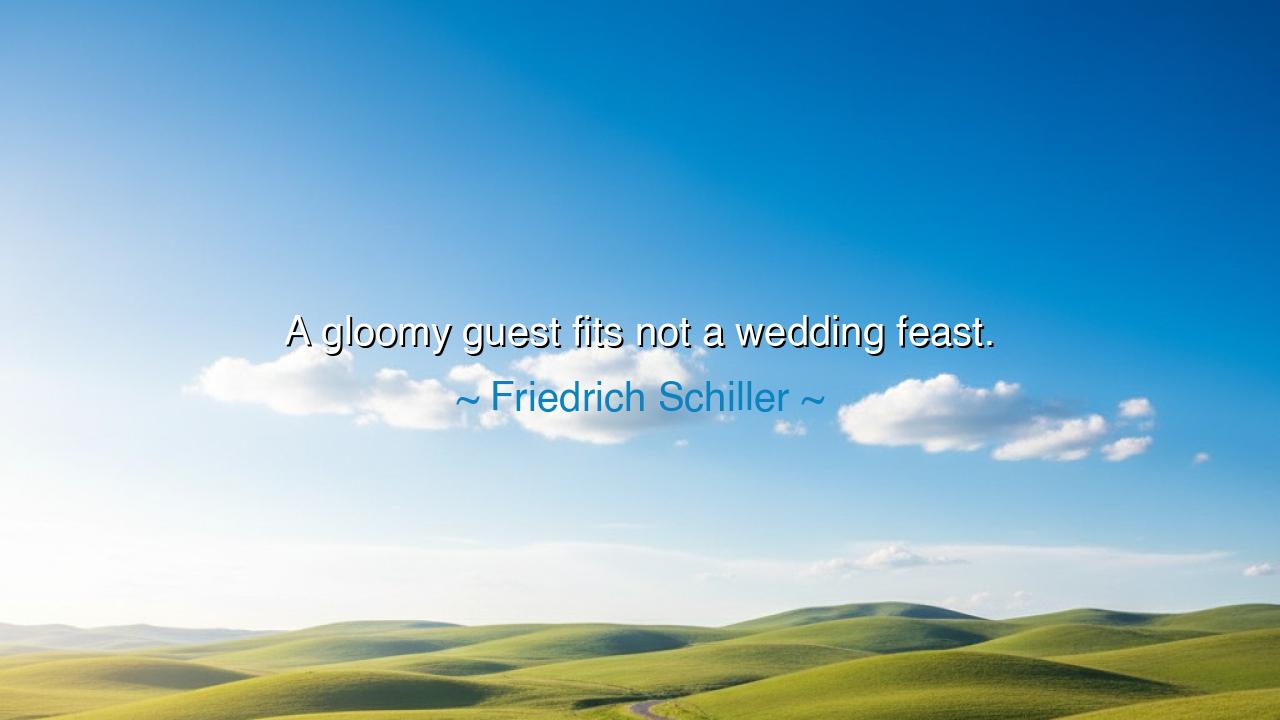
A gloomy guest fits not a wedding feast.






The words of Friedrich Schiller gleam with both simplicity and depth: “A gloomy guest fits not a wedding feast.” In this short maxim lies a great truth—that joy has its sacred times, and sorrow, though worthy, must not intrude where love and celebration are enthroned. A wedding is the covenant of two souls, a day of harmony and promise. To bring gloom into such a place is to shadow the light, to weigh down hearts that were meant to rise.
The wedding feast has, since ancient days, been a symbol of abundance, unity, and blessing. It is more than food and drink—it is a gathering of spirits, each guest offering joy as a gift to the new union. To come burdened with bitterness or sorrow is to dishonor that sacred atmosphere. Schiller, a poet who sought to ennoble mankind, reminds us that our presence in such moments is not for ourselves, but for the couple whose love we honor.
History gives us clear images of this truth. In Homer’s Odyssey, Penelope’s suitors feasted in her halls, yet their hearts were corrupt, bringing arrogance and gloom instead of celebration. Their presence turned a house of marriage into a house of decay, a feast into a mockery. By contrast, at Cana of Galilee, as told in the Gospels, the joy of the wedding feast was preserved when Christ turned water into wine, ensuring that gladness, not gloom, filled the gathering. These stories reveal the ancient weight carried by such feasts: they are to be guarded as sanctuaries of joy.
Schiller’s warning is also a teaching about the duty of every guest. To attend a wedding is not a casual visit but an act of witness and support. The bride and groom look to their guests as living symbols of blessing and encouragement. Thus, each person present must carry not despair but cheer, not complaint but laughter, lest their shadow cast a chill upon the flame of love.
Therefore, let this wisdom be remembered: there is a time for mourning and a time for rejoicing, and each must be honored in its season. To enter a wedding feast is to step into a temple of joy, where every smile strengthens the union and every cheer blesses the future. As Schiller teaches, let none come as a gloomy guest, for in such moments, the highest duty of love is to add to the light, never to diminish it.






YNYen Nguyen
There’s an interesting tension in this idea. On one hand, it’s true — a wedding is meant to radiate happiness, and negativity can dampen that. But on the other hand, real life isn’t so tidy. People bring their pain wherever they go. Maybe the wisdom here lies in timing: knowing when to share your burdens and when to let joy take the stage, even if only for a while.
TNthao nguyen
This quote makes me reflect on social expectations. At joyous occasions, we’re often expected to smile and celebrate even if our hearts are heavy. Is that fair, though? It feels like Schiller is reminding us that emotional harmony matters in communal settings. Still, I wonder if suppressing one’s sadness just to fit in might make the moment feel hollow rather than genuinely festive.
MHle minh hai
I like how straightforward yet symbolic this quote feels. It’s not just about weddings; it’s about knowing when and where certain emotions belong. There’s a time for grief and a time for joy, and mixing the two can be uncomfortable for everyone. But I also wonder — isn’t life always a mix of both? Can anyone truly separate sorrow from celebration, especially when emotions are complex and human?
TThao
This line makes perfect sense — weddings are supposed to be celebrations of joy and hope. Still, I can’t help but think about people who attend such events while silently struggling with sadness. Should they stay away to preserve the happiness of others, or is there room for empathy at such gatherings? Maybe the quote is less about exclusion and more about reminding us that energy affects the collective mood.